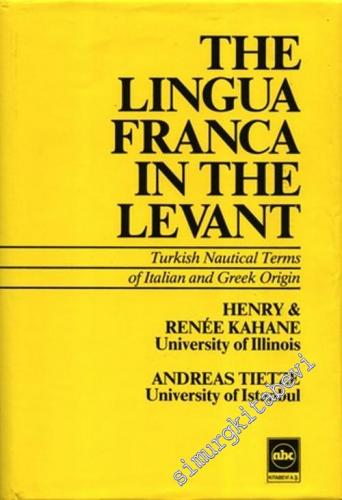#smrgKİTABEVİ The Lingua Franca in the Levant: Turkish Nautical Terms of Italian and Greek Origin CİLTLİ - 1988

Osmanlı döneminde gelişen ticaret hayatında farklı lisanları konuşan (Osmanlıca, Farsça, Yunanca, İtalyanca) insanların kullanmış oldukları ortak dil . Bu kitap aynı zamanda denizcilik terimlerini içeriyor.
***
Since it is only recently that the Moslems have conquered the Land of the Rhomaioi and begun to sail the seas, most of the terms and names given to things pertaining to ships and to the sea are some Spanish, some Italian, and some Greek; they have taken them over at their pleasure. - Hadji Khalifa
The present study on the Lingua Franca in the Levant has a double purpose: the interpretation of a certain (semantically and historically well-defined) area of the Turkish vocabulary, and the demonstration, in the form of brief etymological sketches, of the linguistic-cultural unity of the Mediterranean. The study takes as its starting point the Western and Greek nautical elements in Turkish; these are illustrated as fully as possible. The end point is the Mediterranean distribution and history of each of the terms.
In the gathering of the non-Turkish material the writers have paid particular attention to the Arabic, Dalmatian, and Greek cognates of the words under discussion, in order to present a more detailed picture of the Eastern (and Southern) Mediterranean than has been possible heretofore. The double orientation, at once Turkish and Mediterranean, of the study is reflected, in the composition of the group of workers and in the method followed in the elaboration of the study.
Andreas Tietze, the Turkologist, collected nautical terms used in Turkish that were not, in his opinion, of Turkish origin; from these, Renée Kahane drew up a list of the terms that were, in her opinion, Italian or Greek in origin; for each term on this list Tietze gathered as abundant Turkish technical and literary records as possible; Henry Kahane and Renée Kahane outlined briefly the history of each term in the Mediterranean, trying (often in vain) to establish its ultimate origin and sketching its distribution throughout the Mediterranean, from Portugal to Greece, with Tietze adding the corresponding Arabic material.
This study has a double purpose: the interpretation of a certain (semantically and historically well-defined) area of the Turkish vocabulary, and the demonstration, in the form of brief etymological sketches, of the linguistic-cultural unity of the Mediterranean.
The study takes as its starting point the Western and Greek nautical elements in Turkish; these are illustrated as fully as possible. The end point is the distribution and history of each of the terms.
The discussion of each of the 878 terms borrowed by Turkish is divided into four parts:
- the etymon; originating language
- the Turkish part; the meanings and the development of the word
- the history of the term in the Mediterranean
- notes
Osmanlı döneminde gelişen ticaret hayatında farklı lisanları konuşan (Osmanlıca, Farsça, Yunanca, İtalyanca) insanların kullanmış oldukları ortak dil . Bu kitap aynı zamanda denizcilik terimlerini içeriyor.
***
Since it is only recently that the Moslems have conquered the Land of the Rhomaioi and begun to sail the seas, most of the terms and names given to things pertaining to ships and to the sea are some Spanish, some Italian, and some Greek; they have taken them over at their pleasure. - Hadji Khalifa
The present study on the Lingua Franca in the Levant has a double purpose: the interpretation of a certain (semantically and historically well-defined) area of the Turkish vocabulary, and the demonstration, in the form of brief etymological sketches, of the linguistic-cultural unity of the Mediterranean. The study takes as its starting point the Western and Greek nautical elements in Turkish; these are illustrated as fully as possible. The end point is the Mediterranean distribution and history of each of the terms.
In the gathering of the non-Turkish material the writers have paid particular attention to the Arabic, Dalmatian, and Greek cognates of the words under discussion, in order to present a more detailed picture of the Eastern (and Southern) Mediterranean than has been possible heretofore. The double orientation, at once Turkish and Mediterranean, of the study is reflected, in the composition of the group of workers and in the method followed in the elaboration of the study.
Andreas Tietze, the Turkologist, collected nautical terms used in Turkish that were not, in his opinion, of Turkish origin; from these, Renée Kahane drew up a list of the terms that were, in her opinion, Italian or Greek in origin; for each term on this list Tietze gathered as abundant Turkish technical and literary records as possible; Henry Kahane and Renée Kahane outlined briefly the history of each term in the Mediterranean, trying (often in vain) to establish its ultimate origin and sketching its distribution throughout the Mediterranean, from Portugal to Greece, with Tietze adding the corresponding Arabic material.
This study has a double purpose: the interpretation of a certain (semantically and historically well-defined) area of the Turkish vocabulary, and the demonstration, in the form of brief etymological sketches, of the linguistic-cultural unity of the Mediterranean.
The study takes as its starting point the Western and Greek nautical elements in Turkish; these are illustrated as fully as possible. The end point is the distribution and history of each of the terms.
The discussion of each of the 878 terms borrowed by Turkish is divided into four parts:
- the etymon; originating language
- the Turkish part; the meanings and the development of the word
- the history of the term in the Mediterranean
- notes


















